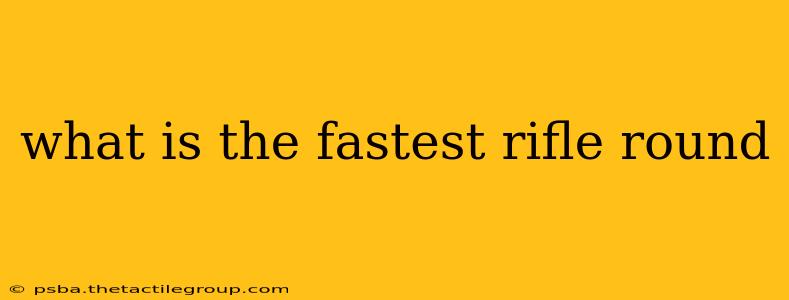Determining the absolute "fastest" rifle round is tricky. The speed of a bullet, measured in feet per second (fps) or meters per second (m/s), depends on several factors beyond just the cartridge itself. These include the firearm's barrel length, the specific powder load used, and even environmental conditions like air pressure and temperature. However, we can explore some of the contenders for the title of fastest rifle rounds currently available.
Top Contenders for Fastest Rifle Rounds
Several cartridges consistently top the charts for velocity, often exceeding 3,000 fps. These include:
1. .220 Swift: A Long-Standing Speed Demon
The .220 Swift, developed in the 1930s, holds a significant place in history for its impressive velocity. While newer cartridges have surpassed it in some specific load configurations, its inherent design still allows for extremely high speeds, often exceeding 4,000 fps with certain handloads. Its relatively small bullet diameter contributes to its speed, as smaller bullets experience less air resistance. However, its relatively small bullet also limits its stopping power compared to larger rounds.
2. .22-250 Remington: A Popular Choice for High Velocity
Another popular choice among long-range shooters and varmint hunters, the .22-250 Remington consistently boasts impressive velocities. Factory loads frequently reach well over 4,000 fps, making it a strong contender for the title of fastest readily available cartridge. Its popularity stems from its balance of velocity and accuracy, making it versatile for a range of applications.
3. .204 Ruger: A Lighter, Faster Round
The .204 Ruger, with its relatively small caliber, prioritizes speed. While perhaps not always reaching the same peak velocities as the .220 Swift or .22-250 Remington in all load configurations, its light bullet and efficient design often allows it to achieve very high speeds, placing it firmly in the conversation of the fastest commercially available rounds.
Factors Affecting Bullet Velocity
It's crucial to understand that the velocity listed on a cartridge box represents a specific factory load fired from a standardized barrel length. Several factors can significantly impact the actual velocity a given round achieves:
- Barrel Length: Longer barrels generally result in higher muzzle velocities as the propellant has more time to fully burn and accelerate the bullet.
- Powder Charge: The amount of propellant used directly affects the pressure and subsequent velocity. Handloaders can fine-tune powder charges to optimize for speed, but this requires careful attention to safety.
- Bullet Weight: Lighter bullets accelerate faster than heavier ones with the same amount of propellant.
- Environmental Conditions: Air density, temperature, and humidity can influence bullet velocity, with denser air causing slightly lower speeds.
The Importance of Considering More Than Just Speed
While speed is an important factor in certain applications, like long-range shooting, it's not the sole measure of a cartridge's effectiveness. Other crucial considerations include:
- Accuracy: A fast round is useless if it's inaccurate.
- Stopping Power: Larger calibers generally offer greater stopping power, even if they have lower velocities.
- Recoil: High-velocity rounds can produce significant recoil, making them challenging for some shooters to handle.
Conclusion: No Single "Fastest"
Ultimately, there isn't one single "fastest" rifle round. The title depends heavily on the factors mentioned above. While the .220 Swift, .22-250 Remington, and .204 Ruger consistently rank among the fastest commercially available cartridges, their actual velocity can vary. The best choice for a specific application depends on the intended use and shooter's preferences.

